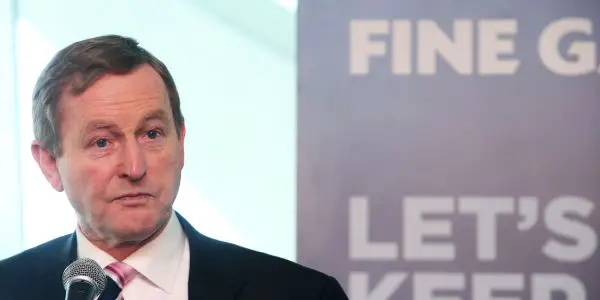Taoiseach Enda Kenny has declared he will resign after a deeply-split parliament could not agree on a new premier.
His outgoing Fine Gael/Labour coalition government will remain on in a caretaker capacity as political parties remain in deadlock about the way forward after the most divisive general election in recent times.
On the first day of the new Dail, Mr Kenny and three other nominated candidates to lead the country failed to secure enough support to be elected as the next Taoiseach.
The other defeated candidates were Fianna Fail’s Micheal Martin, Sinn Fein’s Gerry Adams and Richard Boyd-Barrett of the Anti-Austerity Alliance/People Before Profit grouping.
After the votes, Mr Kenny travelled to Aras an Uachtarain, the official residence of President Michael D Higgins, to officially tender his resignation.
“Let me assure the Irish people that a government remains in place,” he said.
“I and my Cabinet colleagues will continue to work hard in the best interests of the country and all the people.”
Amid the uncertainty about a future administration, Mr Kenny will continue with official duties representing the country at a meeting with US President Barack Obama in Washington on St Patrick’s Day and at the European Council meeting in Brussels next week.
Earlier in the day, a new Ceann Comhairle was elected, Fianna Fail’s Sean O Fearghail, after a secret ballot of TDs.
However, the fractured parliament remains intensely divided on the make-up of a new government, if one can be formed at all.
No party has a majority after voters forced a seismic shift in the Republic’s political landscape at the polls earlier this month.
Outgoing ministers have already conceded it will be weeks, possibly months, before a minority government or a power-sharing alliance could be agreed.
Arch-enemies Fine Gael and Fianna Fail, traditionally the two largest parties who swapped power for generations, are coming under intense pressure to set aside their age-old rivalry to form a “grand coalition”.
Despite little difference between their centre-right outlooks, a power-sharing deal would be fraught with difficulties as many within their rank-and-file hold fast to their distrust of each other, dating back to Ireland’s civil war more than 90 years ago.
Sinn Fein, the third largest party, has said it will not prop up either of the two.
Mr Kenny called for elected representatives to intensify efforts to forge a “lasting and durable government”.
“As Taoiseach, and leader of the largest party in the house, I am fully committed to working over the coming weeks to ensure that the people get the government that they need and that they deserve and that they have given their verdict on,” he added.
Mr Kenny said a substantial number of elected representatives had no interest in taking power, but claimed options remain on the table for forming a new government.
But Mr Martin appeared to resist pressure to enter coalition talks with Mr Kenny.
“The people didn’t vote for Fianna Fail and Fine Gael – I think we must acknowledge that,” he said.
“It is our job to work in terms of interpreting and reflecting that vote now and we’re doing that in the context of our negotiations with Independents and smaller groupings.”
The Fianna Fail leader insisted his party had no mandate to go into government with their foes Fine Gael.
“We certainly didn’t get a mandate to put Fine Gael back into government,” he added.
Mr Martin suggested voters had asked for a “different kind of Dail” and repeated his calls for parliamentary reforms to be agreed before attempts are made at forming a new government.
A number of TDs spoke of the need for Dail reform during the day.
But Sinn Fein’s Pearse Doherty, Labour’s Brendan Howlin and the Independent Alliance’s Shane Ross all said the electorate was more concerned with health, housing and other issues.
